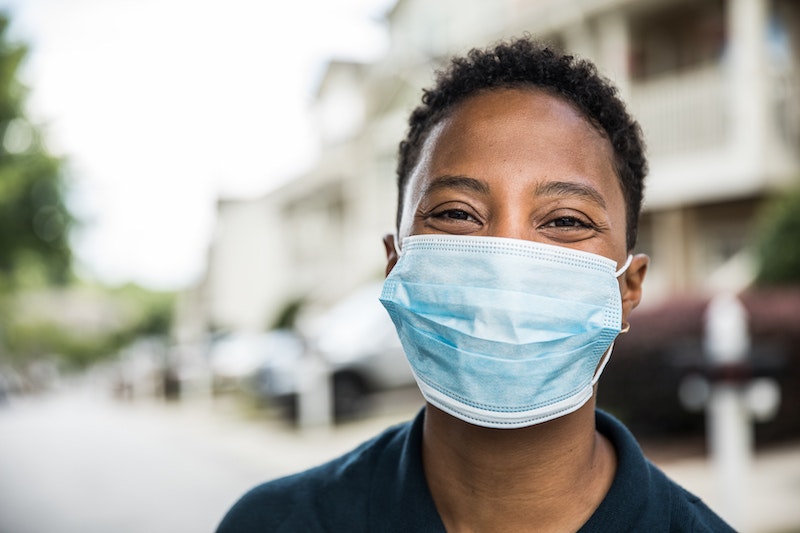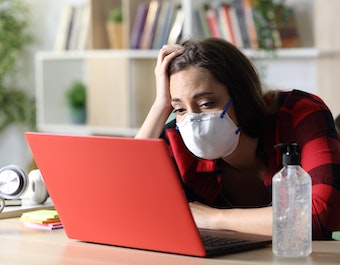If COVID-19 has put the spotlight on your stress, anxiety, or mood shifts, you’re hardly alone: 44% of Americans say they’re more aware of their mental health than they were before COVID, according to Rally Health’s “Preventive Care in America” survey. And nearly a quarter say that their mental health has gotten worse. Our survey also found that the pandemic led about half of us to focus on our health. Surprisingly, among those who have taken steps to focus on their health, 43% say they’re even more satisfied with their life than they were before COVID. That’s right, some people are even doing better in parts of their lives.
It’s natural if increasing COVID cases –– and other stressful current events — have you feeling more on edge than ever. But instead of just coping, it’s possible to find ways to thrive. Much of that means focusing on improving what you can control –– reconnecting with friends, getting more exercise, enjoying a slower pace of life. Experts say that identifying and implementing healthy habits at home may provide the kind of structure and meaning that help you feel better.
“Knowing that we have some sense of control in life is critical in our overall well-being, and essential in the management of loneliness,” says Jodi DeLuca, a Colorado-based licensed clinical psychologist with Erie Colorado Counseling. “Although COVID-19 has placed a multitude of restrictions on so many, we must be mindful and intentional about identifying what we do have control over in our lives.” Sometimes that may mean seeking help from a mental health professional. But some simple habits can also help us thrive.
For inspiration, we spoke to people who have managed to thrive during this challenging year — and asked experts to share tips on how to establish and maintain similar routines.
Move (Even Just a Little)
Before COVID-19, Morgan Halstead, an English professor and mother of two school-age children in Chicago, hit the gym several times a week at 5 am for an intense treadmill-and-weights session. “I was under the belief the only way I could be motivated to exercise was to go to the gym,” she says.
After the shutdown began in March, Halstead cobbled together a mat and a few weights and started following along with local gyms’ Instagram Live workouts. Suddenly, it was easy to squeeze in a 30-minute sweat session during the day –– no pre-dawn wakeup, workout class reservation, or child care required.
Now, seven months later, Halstead has exercised every single day of the pandemic. Her workouts aren’t always as intense as they were at the gym, but the consistency and sustainability of her daily routine has left her feeling more upbeat and less stressed.
Steal This Secret: “Studies show that when it comes to mental health, increasing your activity level even a small amount matters –– a lot,” says Dr. Gregory Jantz, a psychologist in Edmonds, WA. “I see the power of movement become a catalyst for transformation in many areas in my clients’ life.”
If the thought of exercising every day sounds like mission impossible, know that moving even a few extra times a week is worthwhile. And short bursts of activity –– say walking in a nearby park while social distancing, rolling out the yoga mat while watching TV, or dusting off the stationary bike for a low-key ride –– can still buoy your mood, says Jantz.
Get Grateful
When her team began working remotely, Caitlyn Scaggs implemented a “bright spot” segment during her weekly all-staff Zoom meeting. A university administrator in Roanoke, VA, Scaggs says that while the practice “admittedly felt like ‘forced fun’ at first, it developed into a deeper experience that has caused a paradigm shift toward seeing the sunny side –– even during challenging days.”
Experts say that cultivating gratitude is a clinically proven way we can combat feelings of anxiety associated with a loss of control. “Gratitude is a key personality trait associated with positive emotional functioning,” says John Lee, PhD, director of clinical psychology at Los Angeles’ Executive Mental Health. “Studies suggest practicing gratitude can reduce stress, improve sleep and foster better relationships.”
Steal This Secret: Lee recommends making gratitude journaling a daily practice by taking a few minutes before dinner –– when enough of the day has passed that most people can identify something positive that has occurred –– to jot down at least one item on a gratitude list. Or try turning the exercise into dinnertime conversation, with each family member sharing one thing they’re grateful for that day.
And if you have a particularly bad day and can’t muster up even one item? Don’t sweat it. Some people may experience undue anxiety if they feel they have “run out” of things to be grateful for, says Lee, so cut yourself some slack and try again tomorrow.
Cultivate Connections
If the prospect of another Zoom happy hour doesn’t spark joy, find a virtual class or get-together that focuses on a hobby or skill. Linda Spector, a pianist in the San Francisco Bay area, began performing weekly free Facebook Live concerts to offer listeners an escape from watching the news –– and in the process, she says, she’s watched her own mental health improve.
Steal This Secret: Staying connected has been a challenge for many during COVID, acknowledges Erin Scott, a licensed professional counselor and founder of the Healing Space in Boonton, NJ. But doing so is critical to combating feelings of loneliness, depression, and isolation. She suggests scheduling weekly phone calls or virtual dates with family and friends for game night and joining online support groups to meet like-minded people. Talking, rather than typing, can make a big difference in how connected you feel to the friend on the other end of the phone, she says.
Though no two experiences are exactly alike during these unprecedented times, there are lessons to be learned from how others are handling the isolation, stress, and disrupted routines that accompany COVID. And sometimes, these small tweaks can have an outsize impact on our mental health.






